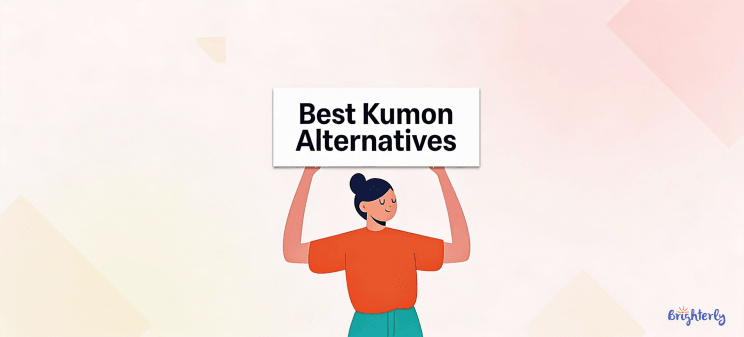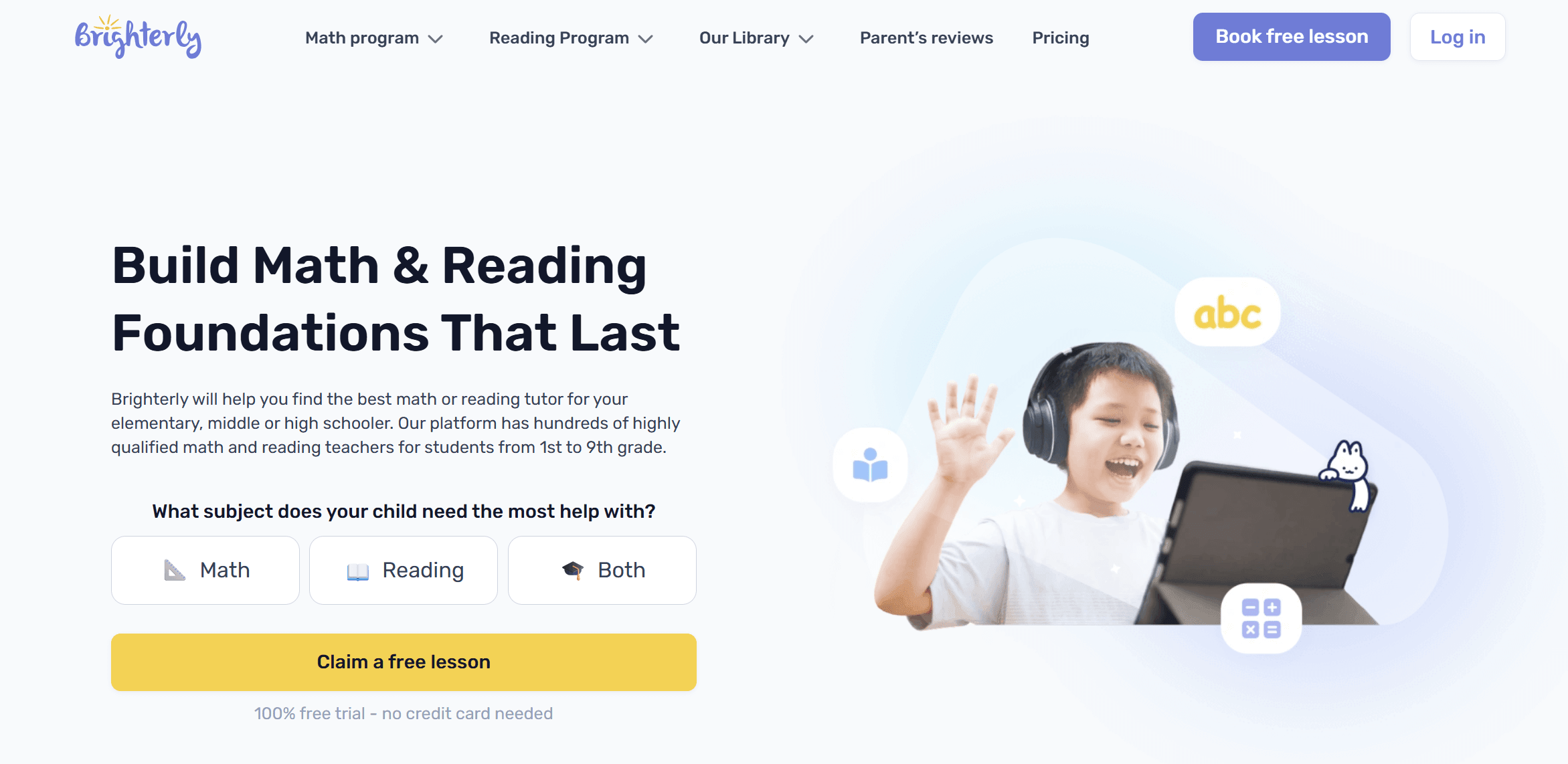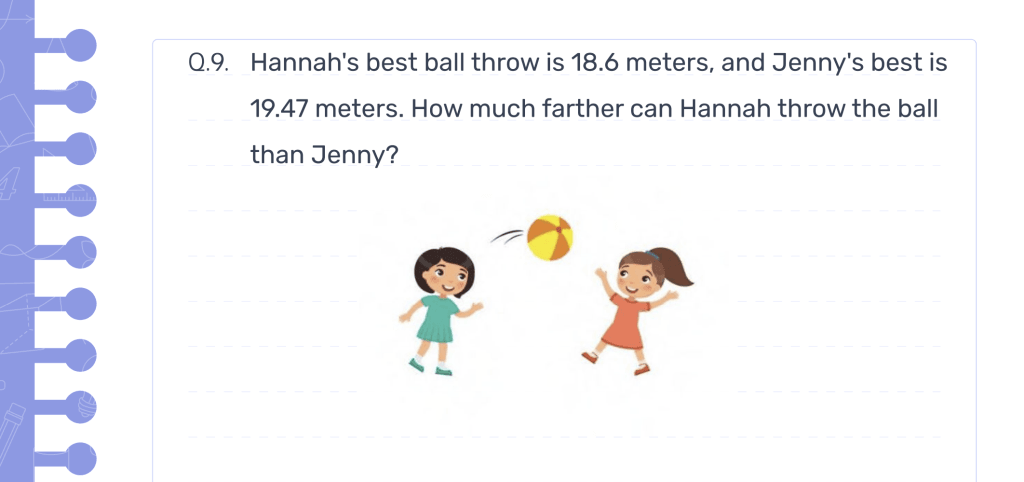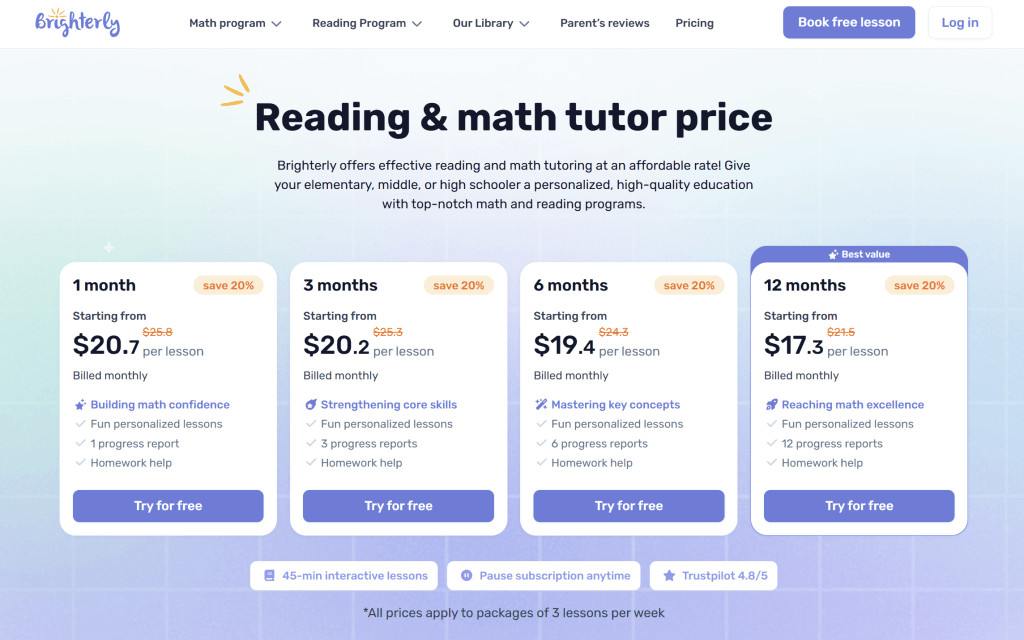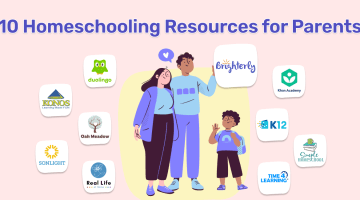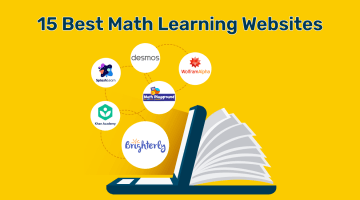11 Kumon Alternatives in 2026
reviewed by Jo-ann Caballes
Updated on January 26, 2026
If you’re looking for the best Kumon alternatives in 2026, I’m here to help you narrow your search. Kumon is an acclaimed educational platform, but it has some shortcomings. Here are other options that I find exciting as an experienced teacher and that may be a better match for your kid.
Key points
- Brighterly is a leading tutoring platform that offers highly personalized, gamified programs for students in grades 1-9.
- Mathnasium is a math tutoring platform for K-12 students, providing customized learning in person and online.
- Best Brains is an after-school program with courses in various subjects.
- Learner is a learning platform for K-12 students, matching students through a screening process.
- Thinkster Math is a tutoring platform that utilizes AI to track progress.
- Wyzant offers a pay-as-you-go model for access to thousands of tutors.
- Khan Academy offers a library of free, self-paced learning courses and resources for various subjects.
- SylvanLearningCenter combines in-person and online, private and small-group tutoring in different subjects.
- Cuemath is an online math-only platform that works for a wide range of ages.
- Mastermind Abacus uses the abacus beads to teach children how to do math calculations.
- IXL provides a comprehensive PreK-12 curriculum including video instruction and fun games.
Exploring alternatives?
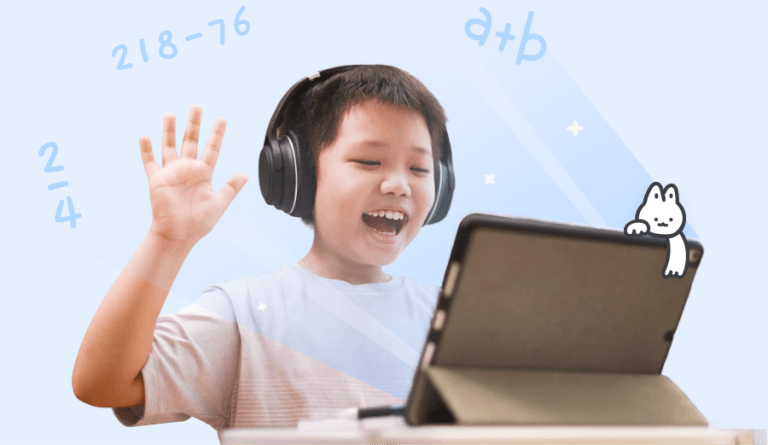
What are the reasons to consider Kumon alternatives?
The most common reasons for parents to start looking for “Kumon alternatives near me” are weak tutors, suboptimal methodology, and expensive pricing.
But before I get into this, let me tell you the basics of Kumon. The program follows the Kumon Method, developed in the 1950s, which makes it somewhat outdated. Kumon aims to build math and reading skills through a structured approach and small-step worksheets, allowing for little personalization.
Before I move to why many families consider Kumon competitors, here are a couple of things parents like about it:
- Self-learning focus: Encouraging students to explore how to solve problems independently.
- Reading skills: Kumon offers a reading program to help kids develop better reading skills.
- Development of core math skills: The program focuses on mastering basic skills like quick and accurate math calculations.
- Small-step worksheets: Children master math skills more efficiently when they complete daily worksheet assignments, as highlighted in Trustpilot reviews.
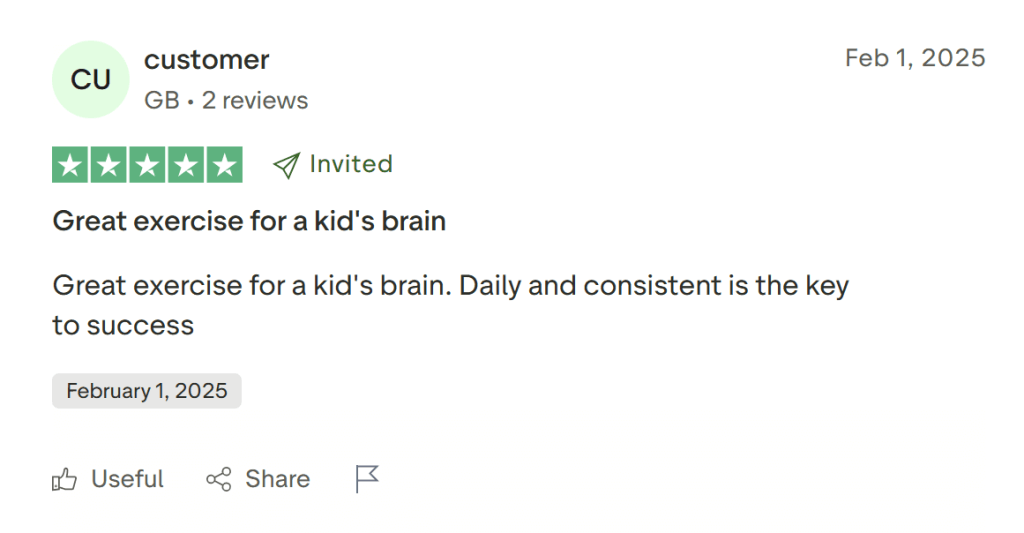
Despite these benefits, Kumon has major downsides. Most importantly, the program relies excessively on repetition rather than engagement. Unlike some alternatives to Kumon, it limits instruction and tutor intervention, provided only when absolutely necessary.
Reasons to choose Kumon alternatives
Inexperienced tutors
Parents report inconsistent Kumon tutors’ expertise and minimal guidance from instructors. This often leads to a lack of improvement in children’s knowledge. Parents are also not allowed in tutoring sessions, as flagged on Reddit, so they cannot check the quality themselves.

Ineffective teaching techniques
Another reason parents decide to switch to a Kumon alternative is that the approach doesn’t motivate students to learn. It puts too much emphasis on how long it takes to complete a task rather than what skills are gained in the process. According to parents’ reviews on Trustpilot, this leads to a quick loss of interest.
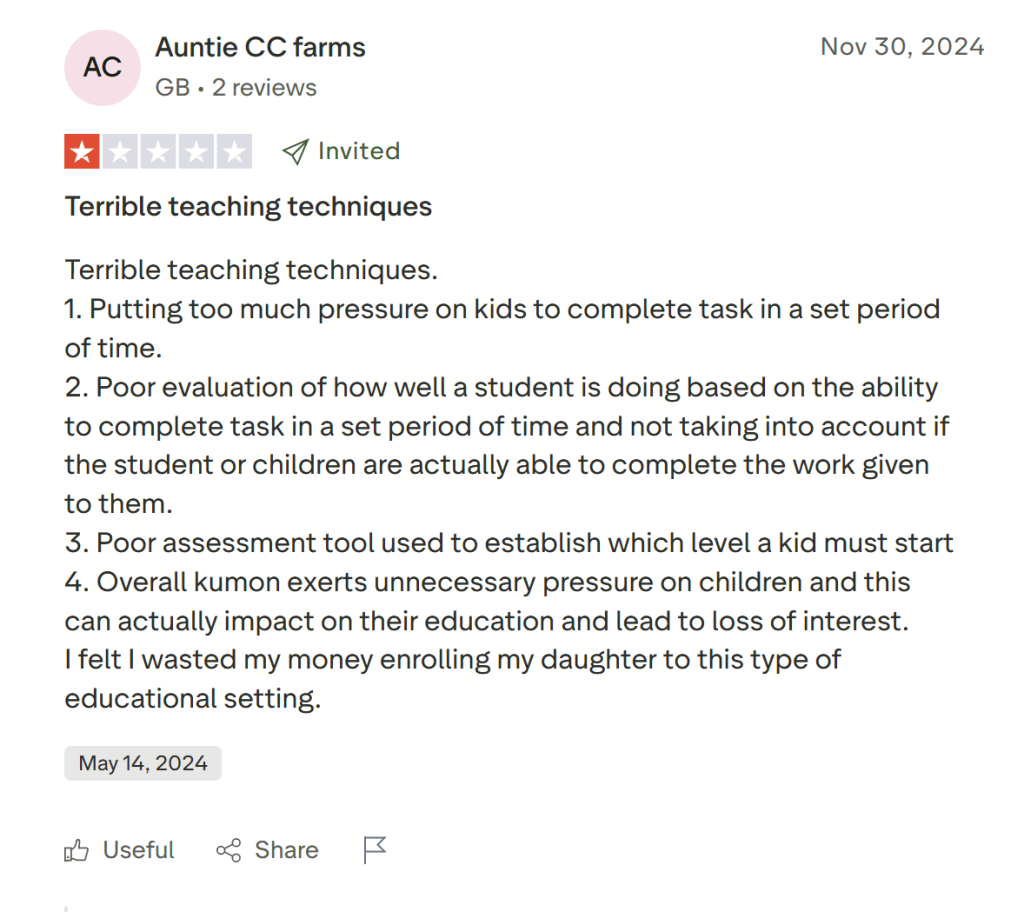
Confusing pricing
Kumon reviews show a lack of pricing transparency, including hidden fees. Kumon costs vary based on location, and the pricing structure is not disclosed upfront. This turns into a common motivator to opt out and look for alternatives to Kumon, as shown on Trustpilot.
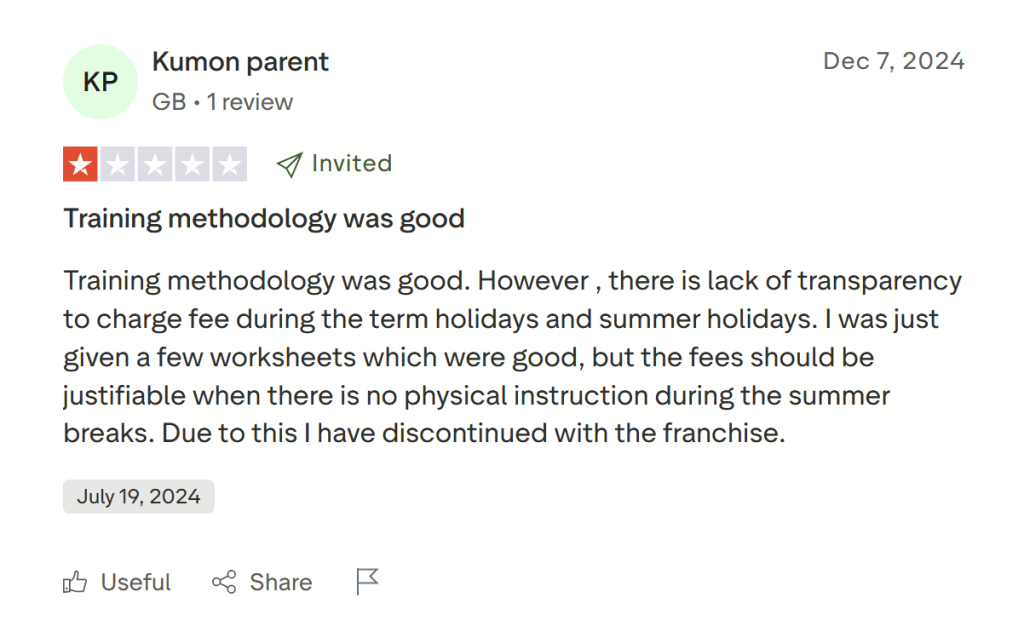
Pros and cons of Kumon
Pros of Kumon |
Cons of Kumon |
Personalized supportKumon offers tutors who will guide your kids through their learning. They’ll grade and evaluate their worksheets to tailor future lessons to your kids. |
Independent work can hinder progressSome parents have reported that the high level of independence needed for Kumon. With no regular tutor support, they can easily get stuck on work. Kumon reviews can be a little negative in this area, unlike other programs like Kumon. |
Worksheets that support learningKumon provides worksheets that your child should complete each day. It recommends 30 minutes a day for the knowledge to be cemented. |
Have to go to a physical test centerWhile the assessments help you monitor your kids’ progress, it can be time-consuming to take your child to an assessment center twice a week. Other Kumon-like programs offer online tutoring, which may be a better option. |
Testing helps to monitor progressYou’ll take your kids to a Kumon center near you twice a week to complete assignments. This helps you monitor their progress. |
The instructors aren’t guaranteed to be qualified in mathAll Kumon learning instructors are trained in the Kumon math tutoring method. But you can’t guarantee they’re also trained math tutors or teachers. When it comes to improving your kids’ math knowledge, you need to be able to trust in a certified tutor or teacher. |
What is the cost of Kumon?
The Kumon cost can range between $165 and $210 per month for just one subject. This varies by the center’s location, and the cost doubles for taking both math and reading.
Kumon also charges an $80 registration fee plus $30 for the initial cost of materials, which is uncommon for other programs like Kumon.
What are the good alternatives to Kumon Learning?
- Brighterly
- Mathnasium
- Best Brains
- Learner
- Thinkster Math
- Wyzant
- Khan Academy
- Sylvan Learning Center
- Cuemath
- Mastermind Abacus
- IXL
When learners ask, “What is the alternative to Kumon?”, several platforms come to my mind, and the Brighterly math tutoring platform is at the top of the list. But let’s discover each option from my top, one by one.
Kumon alternative #1: Brighterly
The Brighterly reading and math tutoring platform is a leader among learning websites for students in grades 1-9.
Best for: 1:1, personalized, teacher-supported studying in math, reading, and writing
Keep on reading to discover why I rank Brighterly as the top of Kumon alternatives online. ⤵️
Brighterly: Features
Professional, compassionate tutors
All tutors in the Brighterly math program (STEM-focused) and reading program hold a Bachelor’s degree (or more) and 5+ years of relevant experience. They’re qualified pedagogists able to adjust learning to the student’s interests and needs.
According to Trustpilot reviews, teachers show outstanding people skills – crucial for building children’s knowledge and confidence. They deliver 1:1, engaging sessions that install a deep understanding of math concepts and reading comprehension while developing critical thinking and problem-solving competencies.
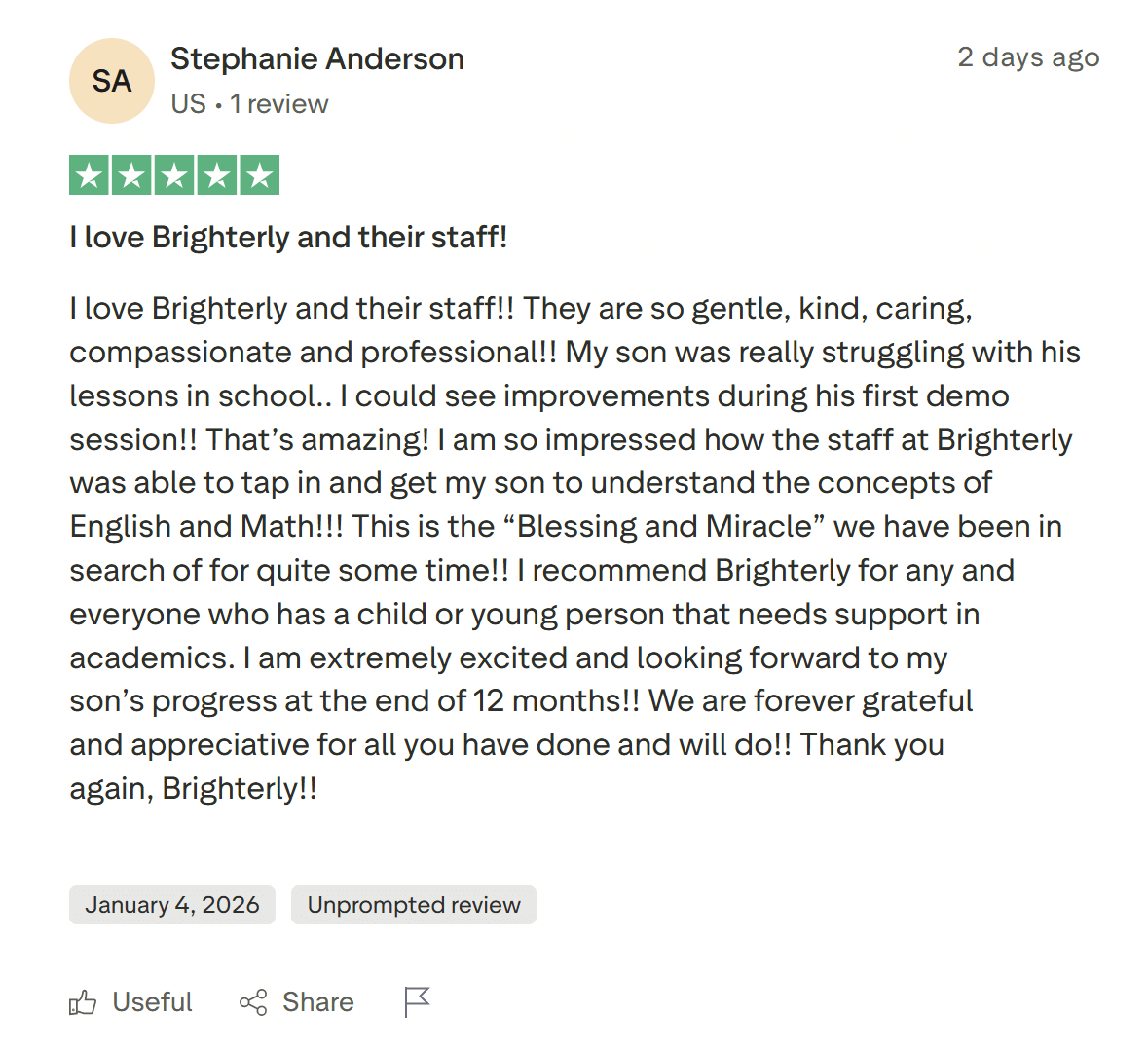
Award-winning, personalized curriculum
The award-winning curriculum, fully based on the United States educational standards, is another reason why Brighterly is a great alternative to Kumon Reading and Math. Meanwhile, the learning plan and materials are individualized after an initial evaluation of the student’s strengths and weaknesses and consultations with parents. This leads to immediate, noticeable advancement, as testified on Trustpilot.
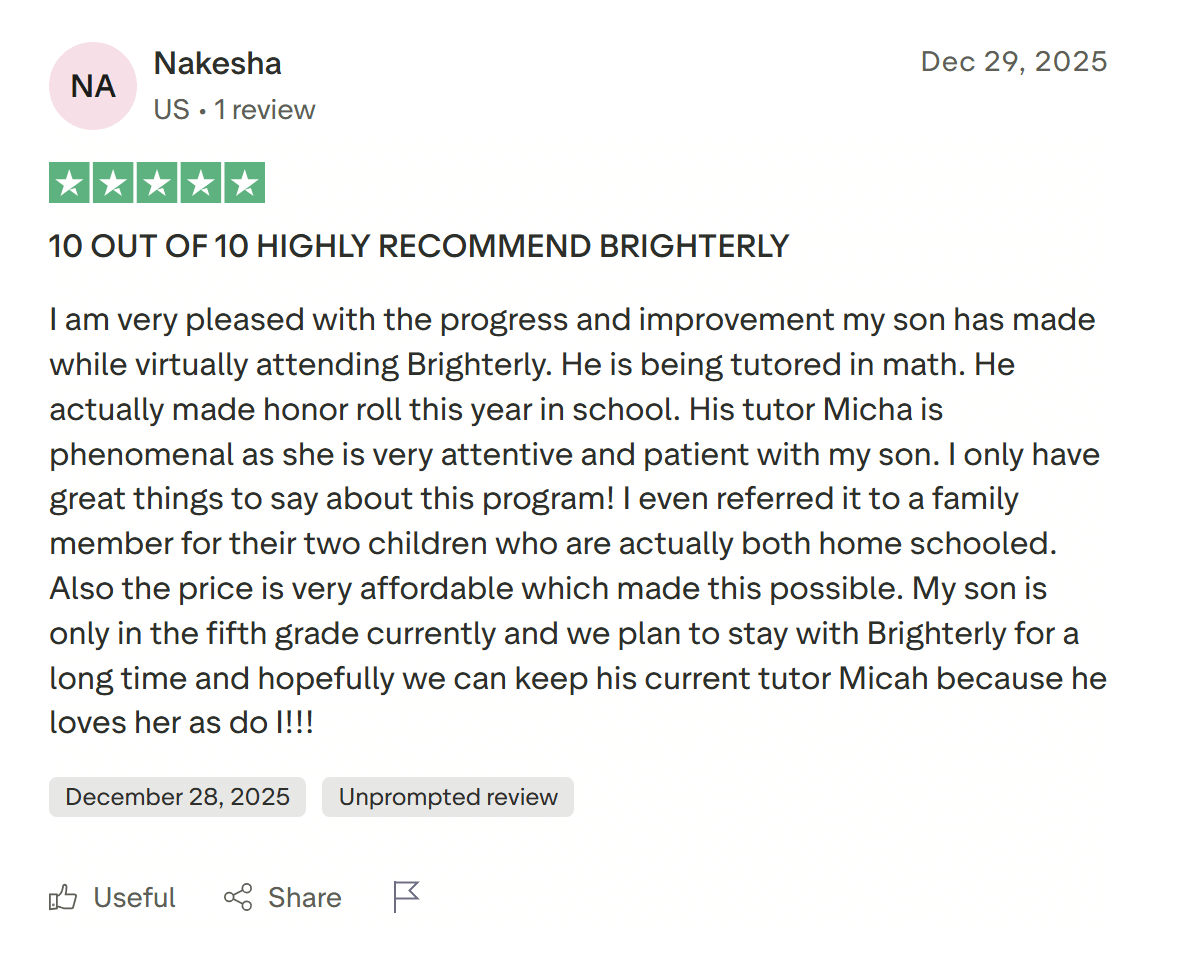
Free learning materials
First, Brighterly offers free reading worksheets and math worksheets to continue developing skills beyond tutoring sessions. They are organized by grade level and topic for quick navigation and can be printed to lower screen time. Brighterly worksheets turn theoretical knowledge into real-life examples, attractive to children.
So, if you’re looking for Kumon like worksheets that are even better, check out Brighterly.
Second, you can access free math and reading tests that are also based on grade. These tests can assess the initial level of your child to help you decide on the top Kumon alternative.
The cost of Brighterly
- 1-month plan: From $20.70/lesson
- 3-month plan: From $20.20/lesson
- 6-month plan: From $19.40/lesson
- 12-month plan: From $17.30/lesson
This is a very affordable price for 1:1 tutoring compared to both Kumon and the average tutoring rate per hour. All Brighterly plans include:
✅ 24/7 support
✅ Detailed progress reports
✅ Lesson recording
How does Brighterly compare to Kumon?
Brighterly and Kumon excel in different areas. Kumon is excellent for drilling exercises, repetition, and sharpening foundational math and reading. It’s a solid choice for students with strong study habits who prefer structured, self-paced learning.
Brighterly is among the top alternatives to Kumon Math and Reading for students who benefit from personalized, interactive learning. Unlike Kumon’s rigid, repetitive approach, Brighterly builds a student-teacher connection through fun and collaborative learning.
If you’re tired of googling things like “Kumon alternatives in 2026 review” or “best Kumon alternatives,” you should try Brighterly.
Brighterly pros and cons
Brighterly pros
- Personalized tutoring
- Learning and understanding concepts, not just memorizing facts
- Fun and engaging sessions
Brighterly cons
- Some kids might prefer in-person learning
- Only available for 1-9 grade
Kumon alternative #2: Mathnasium
Mathnasium is a network of math learning centers for students at elementary, middle, and high school.
Best for: Adaptive learning
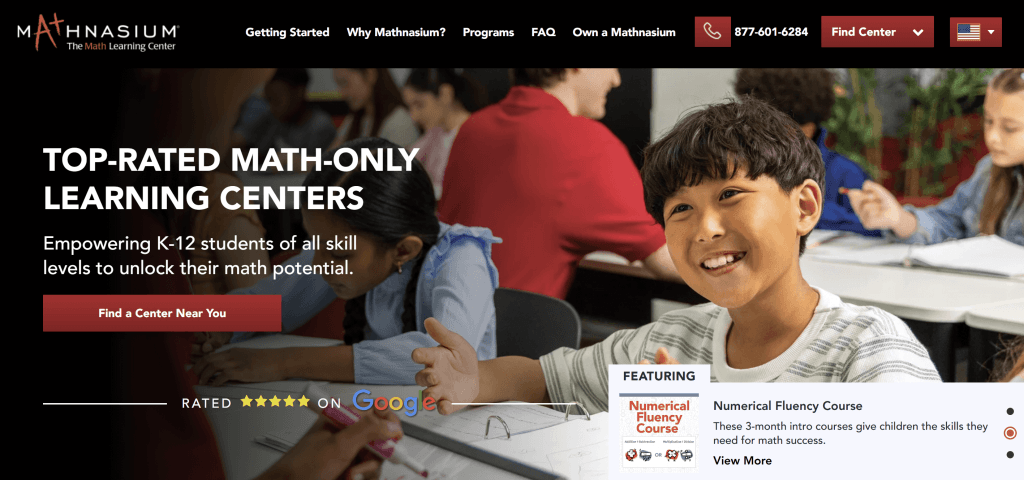
If you’re asking yourself, “Mathnasium or Kumon?”, you should know that Mathnasium is similar to Kumon. However, the former adapts its approach to students’ learning styles.
Who is it for?
Grades: Kindergarten to 12th grade
Mathnasium top features
- Curriculum that adapts to the child’s needs
- Targeted lessons for understanding and comprehension
- Good customer support
Mathnasium cost
- Enrollment fees and assessment: $100-$150, on average
- Mathnasium cost per hour: $25-$75, on average
- Monthly fee: $250-$400, on average
- Summer programs (8+ sessions): $395-$1,000
The Mathnasium cost varies by location. Each center determines its price based on local factors and services offered.
If you’re looking to compare Kumon or Mathnasium pricing, Mathnasium reviews highlight that it provides personalized instruction at a higher price point. This is an important consideration when answering the common question: “Is Mathnasium better than Kumon?”
Mathnasium pros and cons
Mathnasium pros
- Tailored approach to learning
- Tutor matched to your kid
- Wide curriculum
Mathnasium cons
- Can be costly
- Traditional learning
- Limited geographical coverage
How this alternative compares to Kumon
Among alternatives, Mathnasium is one of the most Kumon similar options as it works as a group of tutoring centers with online options. The main difference is that Mathnasium is strictly focused on math, while Kumon teaches reading too. Also, Mathnasium has a more comprehensive approach, unlike Kumo,n which mostly focuses on small-step worksheets.
Kumon alternative #3: Best Brains
As another Kumon similar program, Best Brains offers small-group, in-person tutoring with core programs in coding, math, English, and abacus, plus additional programs covering topics like science labs, SAT prep, homework, and early learner programs.
Best for: Test prep and early learner programs
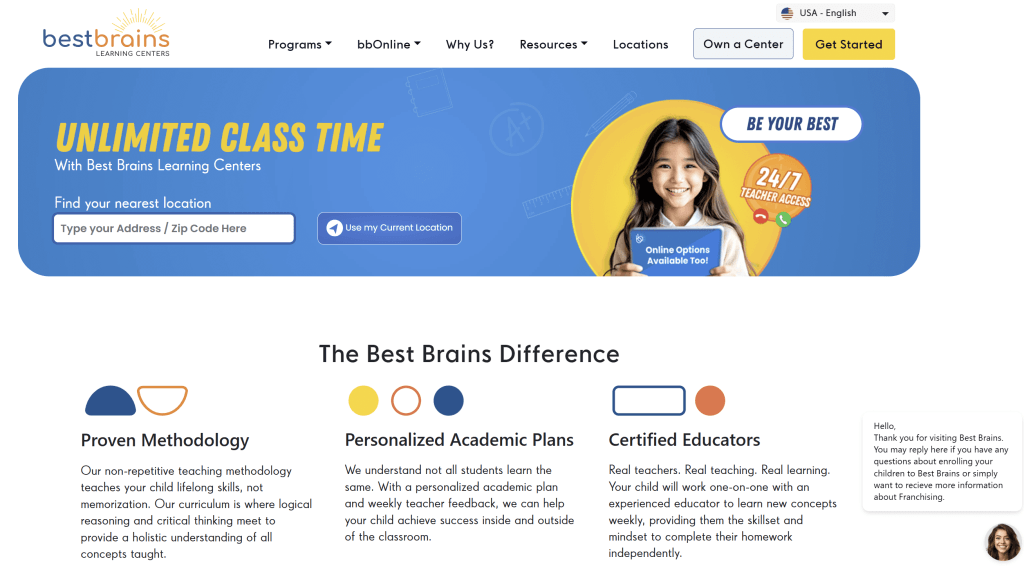
Is Best Brains better than Kumon? Comparison of Best Brains vs Kumon shows that while Kumon offers only math and reading, Best Brains covers various subjects, making it a more convenient option for families whose kids need support in multiple areas.
Who is it for?
Grades: Early learners and students in grades 1-9
Best Brains top features
- Remote and in-person tutoring
- Focus on test prep
- Weekly feedback
Best Brains cost
The Best Brains pricing varies by center, with the following packages, on average:
- 1 subject: $159/month/child
- 2 subjects: $259/month/child
- 3 subjects: $299/month/child
- 4 subjects: $399/month/child
This means Best Brains is a costly alternative to Kumon Math. So, when evaluating “Which is better, Kumon or Best Brains?”, keep the price difference in mind.
Best Brains pros and cons
Best Brains pros
- Remote and in-person learning
- Board-certified teachers
- Focus on passing tests
Best Brains cons
- Lack of personalized learning
- Costly with no free trial
- Tutors aren’t assigned based on needs
How this alternative compares to Kumon
While Best Brains and Kumon are similar, the former provides access to significantly more academic subjects, so it’s a good alternative for students who need a lot of help. However, neither program comes with a truly individualized learning path that can meet the needs of any student.
Kumon alternative #4: Learner
Learner is a virtual learning and tutoring system that offers private math and ELA support from 2nd grade right through to adulthood.
Best for: Custom-matched math tutoring

Learner Tutor reviews emphasize the specific tutoring for SAT and ACT, while Kumon is a general-purpose platform.
Who is it for?
Grades: Students from 2nd grade through college and adults
Learner top features
- Custom-matched tutoring
- SAT and ACT prep
- Thorough tutor vetting
Learner cost
The Learner tutoring cost ranges between $60 and $80 per hour, in most cases. This adds up to a monthly cost of $240-$960, depending on the exact rate and frequency.
Learner pros and cons
Learner pros
- 1:1 tutoring
- Interactive learning platform
- Diligent tutor vetting
Learner cons
- Upfront payments
- Tutors don’t require qualifications
- Costly fees
How this alternative compares to Kumon
While both Kumon and Learner can help students develop skills in math and reading, they take different approaches. Learner operates as an online tutoring platform providing access to many subjects. The focus is on 1:1 learning, but tutors are not necessarily professional teachers. This is different from the Kumon Method, emphasizing independent studying through worksheets.
Kumon alternative #5: Thinkster Math
Thinkster Math works as an alternative to Kumon Math that relies heavily on artificial intelligence (AI).
Best for: Customizable math curriculum and monitoring progress.
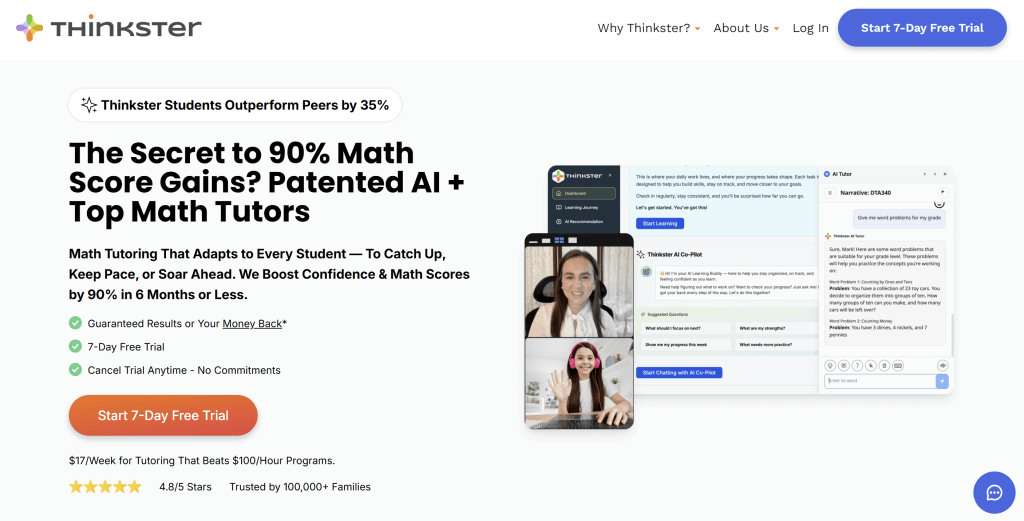
An important difference between Kumon and Thinkster Math is that the latter has a much more adaptive and flexible curriculum.
Who is it for?
Grades: K-12
Thinkster Math top features
- AI-powered math tutoring
- 7-step learning plan
- Parent Insights app
Thinkster Math cost
Thinkster costs depend on the level of service. The pricing starts at $68/week for daily practice, weekly expert tutoring, and progress tracking and goes up with more frequent tutoring sessions and higher personalization. Overall, Thinkster can be more or less costly than Kumon, depending on your child’s needs.
Thinkster Math pros and cons
Thinkster Math pros
- Affordable secondary option
- Parent Insights app for in-depth progress tracking
- Motivation for kids
Thinkster Math cons
- Expensive tutoring
- Completion of goal times can add stress
- High tutor turnover
How this alternative compares to Kumon
Thinkster Math takes a very different approach from Kumon, based on occasional, private, online tutoring (2 sessions/month) with unlimited access to AI support. Meanwhile, Kumon follows a traditional method focused on practice worksheets. Kumon doesn’t offer comprehensive instruction, but students have frequent interactions with teachers (twice/week).
Kumon alternative #6: Wyzant
Wyzant is an online tutoring marketplace that connects students and tutors in math, reading, writing, science, test prep, and more for a total of 300+ subjects.
Best for: 1:1 tutoring and test prep
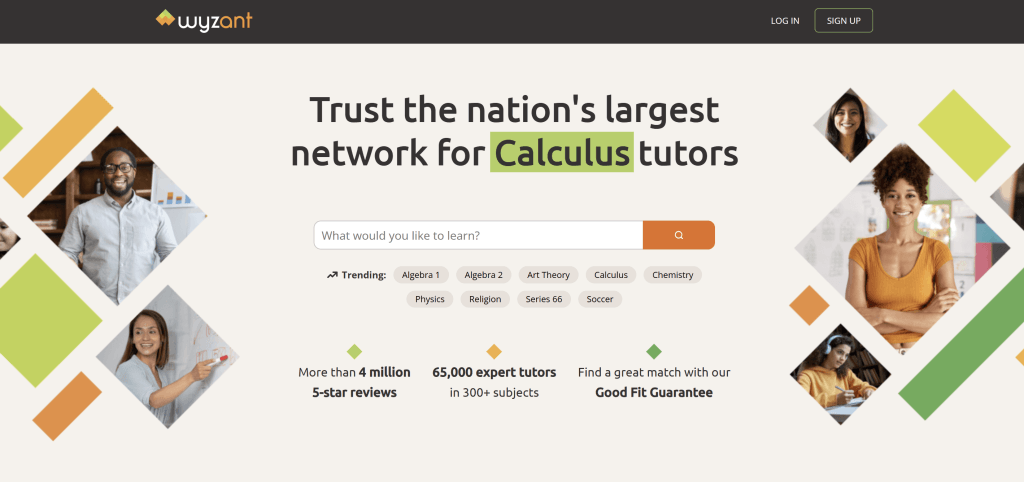
Wyzant reviews show that it is well-suited for students of all ages and professionals seeking academic tutoring, while Kumon is geared toward younger students. Hence, 18 is the answer to the popular question, “At what age should you stop using Kumon?”
Who is it for?
Grades: PreK to high school, college, and beyond
Wyzant top features
- Students pay only for the hours they use
- Advanced search filters help find tutors easily
- Many tutors offer trial lessons to ensure a good fit
Wyzant cost
Wyzant uses a pay-as-you-go model, convenient for personalized learning without a long-term commitment.
- From $10/hour, depending on tutor experience
- Many tutors offer free trial sessions.
- Students pay for individual sessions.
Wyzant pricing ranges from $10 to $100+ per hour (up to $600/hour for highly specialized tutors), while Kumon charges a monthly fee per subject.
Wyzant pros and cons
Wyzant pros
- Students can choose their tutor
- Affordable option
- Going beyond math
Wyzant cons
- It might take a while to find the right tutor
- Costs vary based on the tutor
- No skills assessment
How this alternative compares to Kumon
Wyzant, as one of the popular Kumon alternatives online, provides access to global tutors in any subject and level imaginable, which makes it more powerful than Kumon. Kumon offers more quality control as teachers are certified experts, while anyone can become a Wyzant tutor. But if you’re looking for an affordable option, this could work.
Kumon alternative #7: Khan Academy
Khan Academy is an online learning platform with a library of free, self-paced learning courses and resources for various subjects.
Best for: Free courses
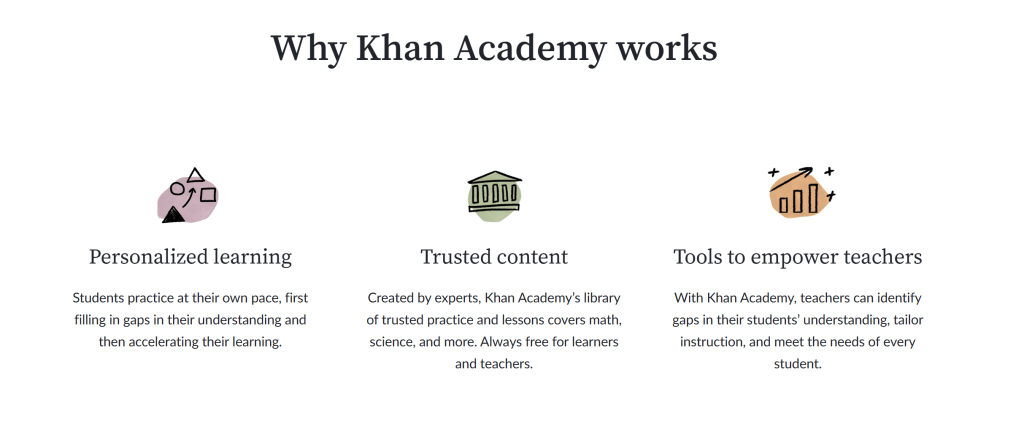
So, is Khan Academy better than Kumon?
Comparing Khan Academy vs Kumon, the latter offers only math and reading, while Khan Academy provides resources across various subjects and levels, such as math, science, history, and economics. If you’re looking for Kumon alternatives in 2026 free, this is definitely your option.
Who is it for?
Grades: PreK-12
Khan Academy top features
- Interactive exercises and quizzes
- Progress tracking
- Completely free
Khan Academy pricing
Khan Academy is free and funded by donations and partnerships. So, if you’re looking for affordable programs similar to Kumon, this might be the platform for you.
Khan Academy pros and cons
Khan Academy pros
- Completely free
- Wide range of classes
- Student-managed learning
Khan Academy cons
- Prerecorded courses
- May not cater to many students
- Some foundational classes
How this alternative compares to Kumon
Among Kumon competitors, Khan Academy is the best for families on a tight budget as instruction and practice are free. While Khan Academy supplies prerecorded videos with little personalization, it’s the more modern learning platform among the two. It’s interactive and gamified, which grabs students’ interest.
Kumon alternative #8: Sylvan Learning Center
Sylvan Learning Center offers in-person and online tutoring in math, reading, and writing, as well as test prep.
Best for: Small-group and 1:1 tutoring
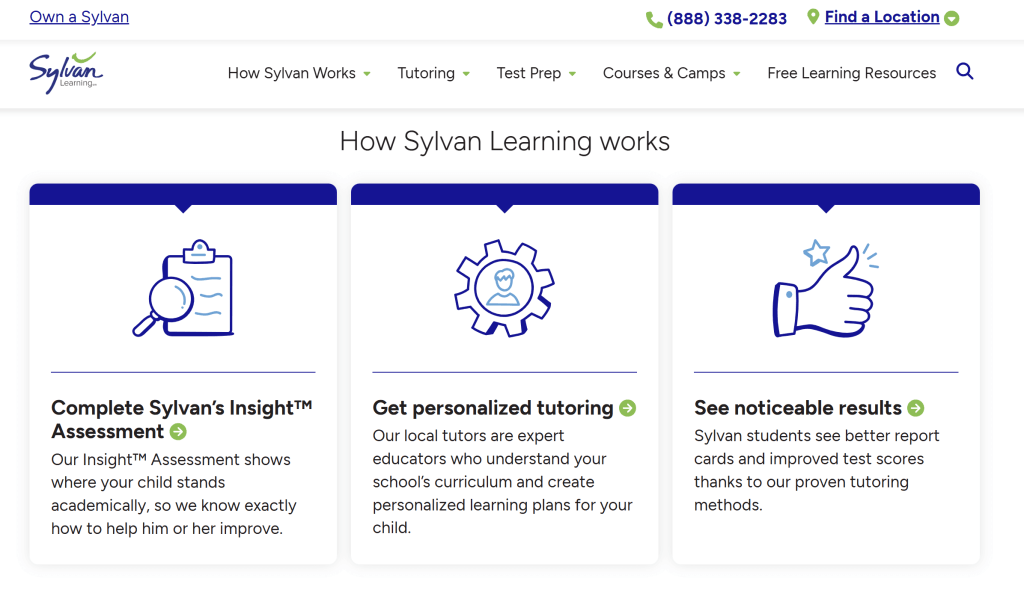
When comparing Kumon vs Sylvan, the latter stands out with the Sylvan approach which emphasizes the unique character of each student and focuses on personalized learning. That makes Sylvan one of the good programs that offer similar services like Kumon.
Who is it for?
Grades: K-12
Sylvan Learning Center top features
- Online and in-person tutoring
- Small-group and 1:1 tutoring
- Proprietary Sylvan teaching method
Sylvan Learning Center cost
The Sylvan Learning Center cost for tutoring and homework support starts at $50/hour. The cost depends on the tutoring style (in-person vs online), location, frequency, and other factors. Meanwhile, SAT and ACT group classes cost $900+ per class, which is expensive.
Sylvan Learning Center pros and cons
Sylvan Learning Center pros
- Customized tutoring services
- Flexible options
- Good tutors
Sylvan Learning Center cons
- Hefty price
- Passive approach to tutoring (Some Sylvan Learning Center reviews mention that tutors provide ready solutions instead of allowing children to figure them out themselves.)
- Not a good fit for students with learning disabilities
Note: Sylvan costs more than Kumon and many of its competitors. It’s far from Kumon alternatives free of charge.
How this alternative compares to Kumon
At first sight, Sylvan and Kumon are similar as they provide in-center and online support in math and reading. However, a closer look reveals that Sylvan takes a more nuanced approach that considers the individuality and specific needs of each student, without so much emphasis on repetitive exercises. Thus, the higher cost might be worth it.
Kumon alternative #9: Cuemath
Cuemath is a math tutoring online platform that provides 1:1, real-time sessions for students from PreK to 12th grade.
Best for: Synchronous, private online math tutoring
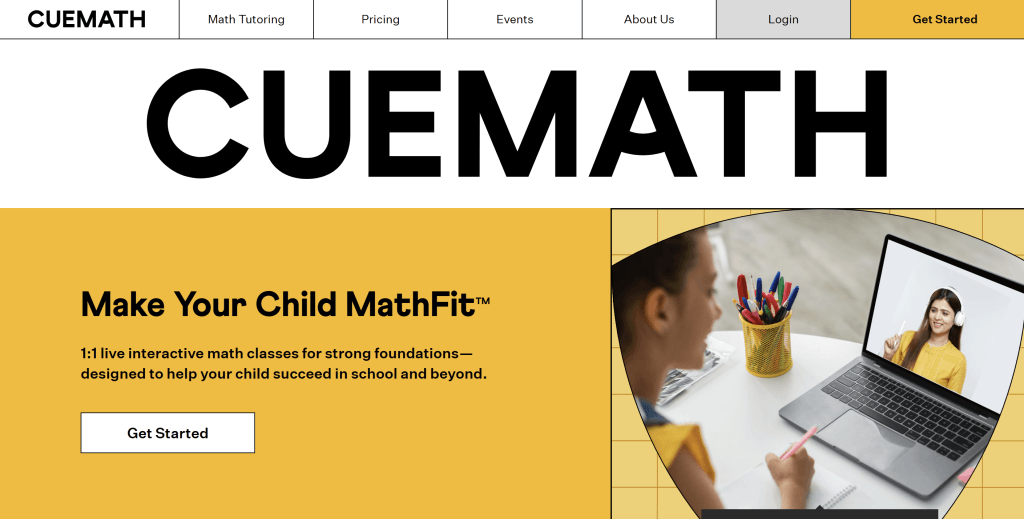
Alternatives to Kumon include online platforms like Cuemath. Looking at Cuemath vs Kumon, you should note that the former focuses on 1:1 tutoring rather than worksheets, but is limited to math.
Who is it for?
Grades: PreK-12 grade
Cuemath top features
- Interactive 1:1 online math classes
- Focus on thinking over memorizing
- Parent app to track progress
Cuemath cost
Cuemath has a complex pricing model, where the final cost depends on grade level, subscription duration, number of classes, and others. The price starts at $22.50/class with a 6-month subscription for grades PreK-1.
A Cuemath review shows that the platform is likely to cost significantly more than Kumon.
Cuemath pros and cons
Cuemath pros
- Modern approach
- Individualized learning
- Deliberate building of fundamental math skills
Cuemath cons
- Limited subject coverage (If you’re looking for Kumon like programs near me with a wide subject coverage, Cuemath will disappoint you.)
- Unpredictable quality of tutors
- Complicated pricing
How this alternative compares to Kumon
Unlike Kumon, Cuemath is entirely online and significantly more personalized. Tutoring is aligned with student needs rather than generic worksheets. But the main shortcoming of Cuemath compared to Kumon is the strict focus on math, which means that children with problems in reading cannot benefit from the platform.
Kumon alternative #10: Mastermind Abacus
Mastermind Abacus is a math-focused learning program that teaches kids by visualizing the abacus and calculating mentally.
Best for: Abacus-based math problem-solving
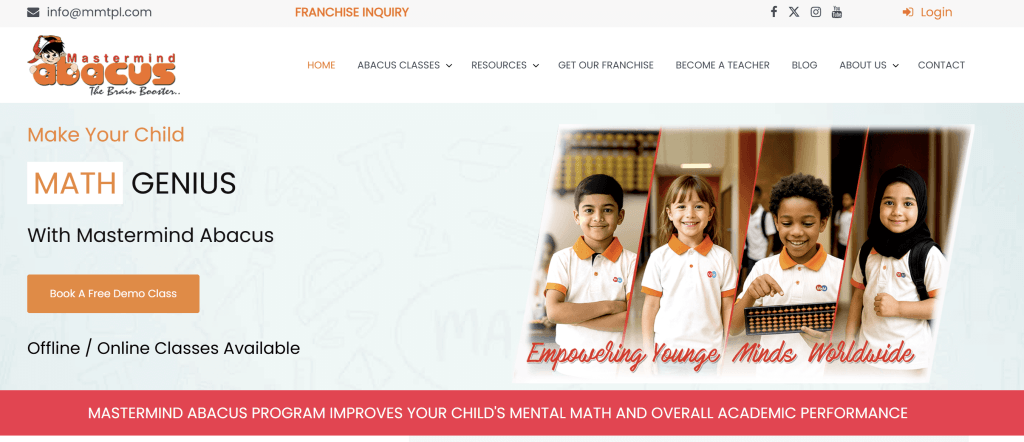
Mastermind Abacus is another alternative to Kumon Math. Families can select whether to attend in person or from the comfort of their home. Mastermind Abacus offers a game-based learning program to start building a sense of math in young kids.
Who is it for?
Grades: PreK-9
Mastermind Abacus top features
- Unique abacus-based approach
- 10-level structured math classes
- Focus on visualization and photographic memory
Mastermind Abacus cost
The Mastermind Abacus website doesn’t provide even approximate cost estimations. Parents need to get in touch to get a custom quote based on location and other factors. So, it’s impossible to compare Kumon vs Abacus pricing.
Mastermind Abacus pros and cons
Mastermind Abacus pros
- Unique teaching methodology
- Online and offline classes
- Structured math program
Mastermind Abacus cons
- No personalization
- Inadequate for children with learning challenges
- Lack of price transparency
How this alternative compares to Kumon
Mastermind Abacus is a very close alternative to Kumon Math as they both focus on building mental math skills, albeit through different approaches. While Mastermind Abacus teaches children how to do calculations with an imaginary abacus, Kumon supplies practice worksheets. Another difference is that the competitor is restricted to math only.
Kumon alternative #11: IXL
IXL is an e-learning platform with a complete curriculum for PreK-12 grades to be used to supplement public education or for homeschooling. Through a skills-based approach, the program covers math, ELA, science, social studies, and Spanish.
Best for: Comprehensive PreK-12 curriculum

Comparing IXL vs Kumon, the first one offers more extensive instruction and game-based practice (rather than traditional worksheets) but without the option to study in a center environment.
Who is it for?
Grades: PreK-12 and adults
IXL best features
- All-inclusive curriculum for PreK-12 grades
- Immersive learning experience
- Real-time insights and analytics
IXL pricing plans
- Single subject: $9.95/month (math or language arts)
- Combo package: $15.95/month (math and language arts)
- Core subjects: $19.95/month (math, language arts, science, and social studies)
The monthly IXL cost is lower than Kumon, especially if you need a few subjects. The platform offers a 30-day satisfaction guarantee.
IXL pros and cons
IXL pros
- Customized learning plan
- On-demand video lessons
- Educational game-based practice
IXL cons
- Lack of teacher-led instruction
- No in-person options (If you’re looking for in-center learning places like Kumon, that’s not the right one.)
- Inconsistent quality across subjects, reported in IXL reviews
How this alternative compares to Kumon
IXL offers wider subject coverage, more instruction, and more diverse practice options than Kumon. It can work as an independent curriculum for homeschooling. IXL also implements a more modern, gamified approach to education, but, at the same time, there’s neither real teacher interaction nor in-person learning in a center.
Top alternative to Kumon Reddit
For an in-depth overview of the best Kumon alternatives, I supplemented my own research with parents’ reviews on Reddit and Trustpilot. This helps me evaluate which of these options works in practice.
Brighterly emerges as a top competitor of Kumon with an average Trustpilot rating of 4.5. Parents praise the student-tailored approach, professional tutoring services, and caring teachers.
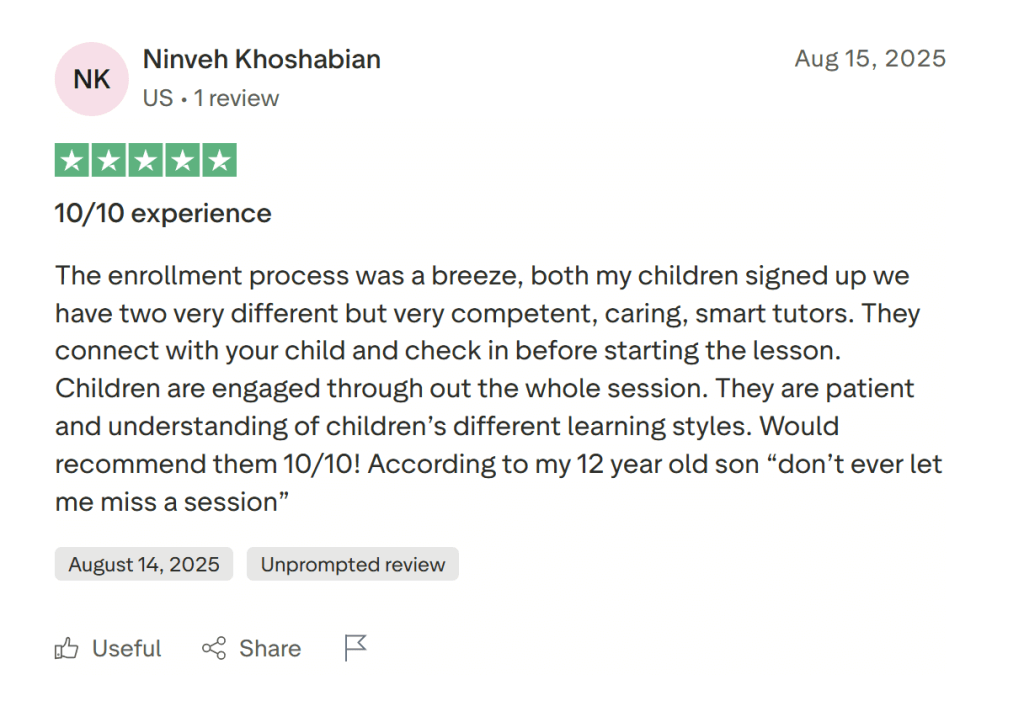
Reddit users also recommend private tutoring, in line with Brighterly’s core, to avoid problems faced at Kumon.

Additionally, in terms of an alternative to Kumon, Reddit users suggest Mathnasium.
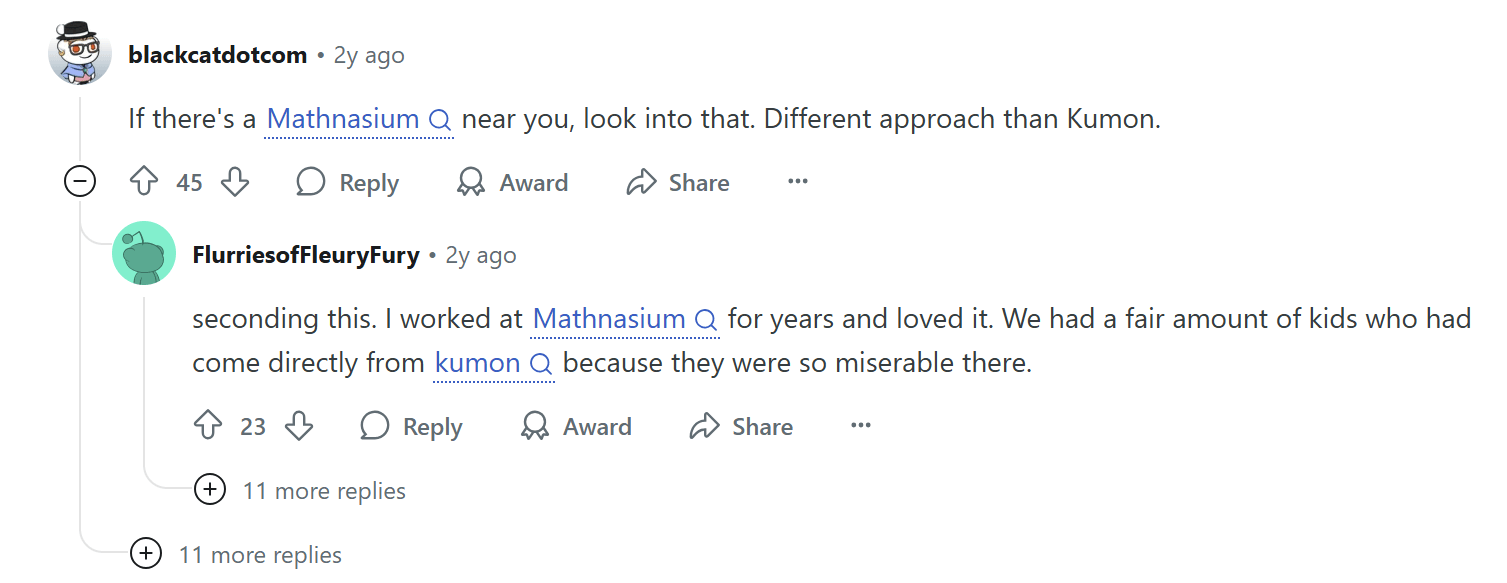
Best alternative to Kumon for your child: How to choose
Many parents look for Kumon alternatives due to its rigid approach and hidden fees. The bottom line is:
- If you’d like to juggle online and offline studying, you can check Best Brains, Sylvan Learning Center, Mastermind Abacus, and Mathnasium.
- If your family is on a budget, you can consider Khan Academy or Wyzant.
- If you homeschool or roadschool, you can look into online options like Learner, Thinkster Math, Cuemath, or IXL.
- And if you’re seeking the best way to boost your child’s academic performance and enhance their confidence, then Brighterly is the right choice.
Unlike other alternatives to Kumon, Brighterly offers:
✅ Fully customized STEM-focused,standards-aligned learning
✅ Professional, warm-hearted tutors
✅ Affordable rates
Ready to make a move to a better learning program? Book first free lesson with Brighterly to see the difference 1:1 tutoring can make.
Additional platforms
If you’d like to look into more options to find the right program for your kid, check out:

